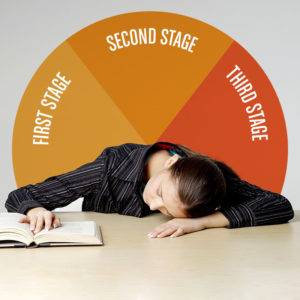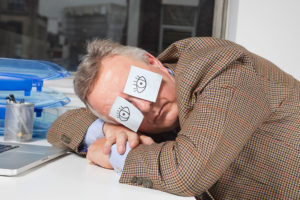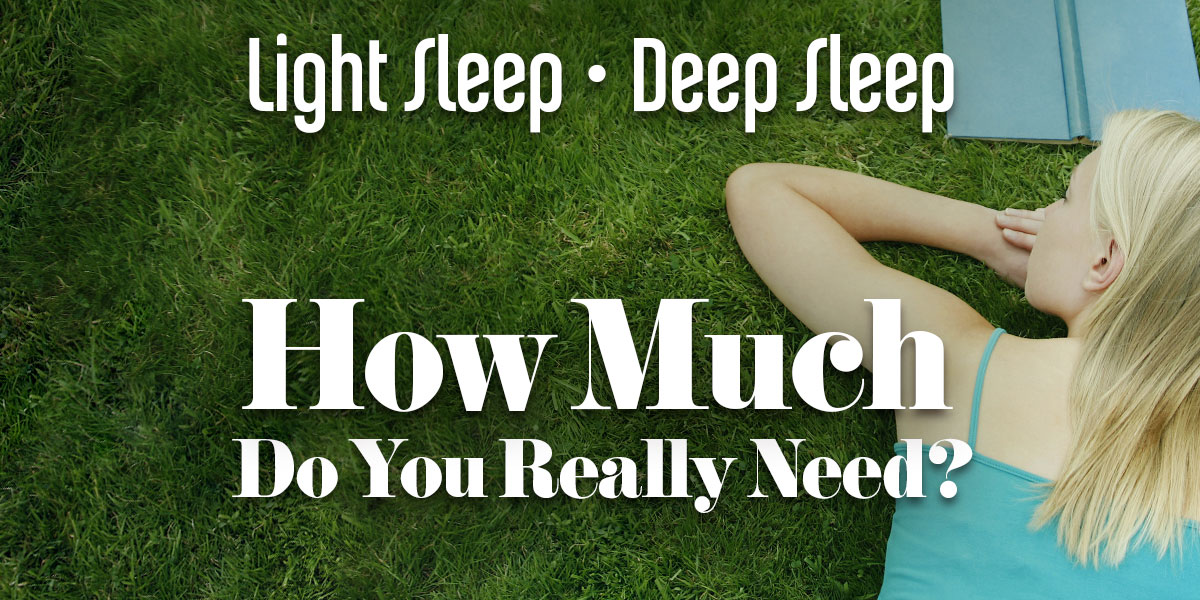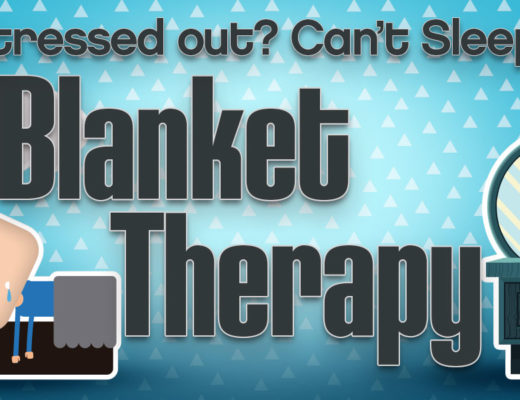How we talk about sleep can be pretty confusing sometimes. We tend to think of sleep as one function, but make distinctions like “light” and “deep” or “heavy” without really understanding what they mean. Making matters worse is the fact that some of the functions of sleep still remain a mystery to us.
So what is the difference between light sleep and deep sleep? Despite what you might think, they aren’t separate types of sleep so much as they are different stages of sleep. When you sleep at night, you’re actually experiencing a number of cycles, and each one is comprised of the same stages that include light and deep sleep. Though they have different properties, they both comprise the same sleep state.
What Are The Stages of Sleep?
 Before we can really discuss the differences between light sleep and deep sleep (as well as what it means to get too much or too little sleep), we first have to understand the different stages of sleep. Sleep studies identify three distinct stages of the sleeping process. Your body actually cycles through all these stages in a specific order, repeating the cycle as you snooze throughout the night until you wake up. Each of the three stages serves its own purpose and your brain performs different functions as you progress through each of them.
Before we can really discuss the differences between light sleep and deep sleep (as well as what it means to get too much or too little sleep), we first have to understand the different stages of sleep. Sleep studies identify three distinct stages of the sleeping process. Your body actually cycles through all these stages in a specific order, repeating the cycle as you snooze throughout the night until you wake up. Each of the three stages serves its own purpose and your brain performs different functions as you progress through each of them.
First stage.
The earliest phase of sleep is, understandably, what you feel when you first fall asleep. Though your eyes are tightly closed, your brain is still alert and it’s very easy for you to be woken up at this point. First stage sleep isn’t particularly restful and there is no rapid-eye-movement (or REM) yet. However, this stage doesn’t last very long (about ten minutes).
Second stage.
Similar to the previous stage, your sleep can still be easily disrupted at this point. However, your body is much more active here, going through several restorative processes at once. You heart rate, as well as your breathing, will begin to lower during the second stage as your metabolism enters its own regulatory phase. It’s here where we spend most of our time sleeping, leading researchers to believe that the primary function of sleep is restorative.
Third stage.
The restorative processes that start in the second stage peak at this time. The sleep you achieve during this phase is the deepest you’ll experience, and as a result, it’s very difficult to be awoken here. While your body is working hard at rearing itself, some of the odder things that can occur when you’re getting your forty winks to happen here, like sleepwalking and talking in your sleep.
(Stage three used to be divided into two stages by the sleep study community. While some still include the fourth stage, most have chosen to combine it with the third).
REM sleep.

As the name implies, the majority of rapid-eye-movement happens here. The result is seemingly contradictory things happening physically: while your breathing and heart rate grows more rapid, your body nearly stops moving. REM stages are brief and not deep. If you wake up during a REM stage, you’ll feel very groggy and possibly even confused, at least for a short while. The dreams you can recall happen during REM sleep.
A cycle starts at stage one, progresses sequentially to stage three, works backward to the second stage, enters REM, and repeats. Each cycle lasts 90 to 120 minutes, and throughout the night we go through four to six of these cycles, experiencing several phases of light, deep, and REM sleep.
Each of these stages has its own significance, as made evident to their sequence. While the first stage doesn’t boast any major physical or mental activity, it’s needed to transition from being awake to entering sleep. Meanwhile, the second stage itself is largely concerned with physically relaxing the body and doing some minor healing. The third stage continues the processes of the previous stage while the brain processes information learned during the day, committing things to short term and long term memory.
Though we ultimately don’t know entirely why we need REM sleep or the significance of dreaming, doctors have been able to observe the changes the body goes through during each phase of sleep. In terms of physiological functions, the vast majority of it occurs during the third and REM phases. Though we cycle through all four phases several times each night, what we tend to think of sleep happens during these later stages.
So now that we understand what the sleep cycle is, how does it relate to how much sleep we get? Let’s take a look.
What Is Light Sleep?
 Stages one and two make up light sleep. Your brain is still alert at this time, even when you’re sleeping, and remains very responsive to external stimuli. As a result, if you wake up during either stage, you won’t feel very rested at all (hence why we call it “light sleep”). Of the two, the first stage is more easily disrupted than the second but is the only state that doesn’t get repeated as part of a sleep cycle.
Stages one and two make up light sleep. Your brain is still alert at this time, even when you’re sleeping, and remains very responsive to external stimuli. As a result, if you wake up during either stage, you won’t feel very rested at all (hence why we call it “light sleep”). Of the two, the first stage is more easily disrupted than the second but is the only state that doesn’t get repeated as part of a sleep cycle.
Dreaming technically begins in the second stage, but because you haven’t yet entered deep sleep, you aren’t likely to remember these dreams in detail. It’s also during the second stage that the body begins various maintenance tasks. For some, the term “light sleep” may imply that they didn’t spend much time asleep at all, but it’s actually the sleep state we spend the most time in.
Some people use the term light sleep when what they really mean is poor sleep, but the two terms shouldn’t be confused. The two stages of light sleep we experience are not of a lesser quality than the deep sleep that follows. With the majority of sleep, we experience each night being in the light stages, so it’s actually the foundation of a good night’s sleep. Not only is it necessary to achieve the later stages, but the restorative nature of sleep can only begin in the second stage.
What Is Deep Sleep?
 Deep sleep begins properly in the third stage. Ironically, even though the brain has actively stopped thinking, you don’t actually dream here. Instead, the healing process that started in the second stage continues. Specifically, your body is repairing itself on the cellular level.
Deep sleep begins properly in the third stage. Ironically, even though the brain has actively stopped thinking, you don’t actually dream here. Instead, the healing process that started in the second stage continues. Specifically, your body is repairing itself on the cellular level.
Finally, REM sleep rounds out the cycle (after stage three transitions back to stage two). Though your eyes are moving rapidly, the rest of your body is essentially motionless. The amount of activity from the third stage increases in REM, but your body only spends around ten minutes in this state before returning to the second stage. One of the theories proposed for this by sleep researchers is that the brain wants to leave REM sleep quickly because it has little awareness of what’s happening around you during REM.
Though being woken during REM sleep can result in what’s known as sleep inertia, deep sleep is still more refreshing than light sleep. When someone says they feel well rested, it’s most likely because they got sufficient deep sleep. In fact, the body can recognize when it’s lacking in deep sleep and has a unique way of compensating for it: when you “oversleep” or sleep longer than you expected, most of the extra time is spent in stage three.
How Much is Too Much Sleep?
When you were growing up, did your parents give you a strict bedtime? If they did, it’s probably because they wanted to make sure you were getting enough sleep. The dangers of getting too little sleep are drilled into us from an early age. But what’s talked about much less frequently is the risk posed by getting too much sleep. But before we can talk about these risks, we have to detail some things a little further.
First, the average person needs between six and nine hours of sleep. Obviously, age can you increase or decrease the amount (toddlers, for example, get away with more sleep because growth hormones are released during stage three of the sleep cycle, whereas older folks get closer to six or seven because they spend less time in deep sleep performing those functions). But for adults, six to nine is the range we should go for. This only applies to when you sleep at night, however; short naps don’t impact this number very much.
Second, and most importantly, you should understand what a sleep deficit is. While we may set alarms to keep us on point. Our body has a way of recognizing how much sleep we’ve gotten and waking up when we’ve hit the sweet spot. So, if you pull an all-nighter and don’t get your full sleep. Your brain will try to force more sleep on you the next night to make up for it. This is perfectly natural but for the reasons we’re about to get into; you shouldn’t make a habit of relying on this self-correction.
What Are The Dangers of Too Much Sleep?
You may be surprised to learn that sleeping too much and sleeping too little carry the same risks. Some of the more commonly recognized risks are increased risk of obesity (due to lower levels of energy and lowered metabolism), memory impairment, and increased risk for heart disease. People who get insufficient sleep suffer stunted sensory awareness, leading to a higher number of injuries and earlier deaths.
 Excessive sleep also has a symbiotic relationship with mental illness, specifically depression. Mental health experts consider oversleeping to be a sign of depression when making a diagnosis, but people who are depressed report that they feel compelled to sleep more. Many don’t even recognize that this compulsion worsens their symptoms.
Excessive sleep also has a symbiotic relationship with mental illness, specifically depression. Mental health experts consider oversleeping to be a sign of depression when making a diagnosis, but people who are depressed report that they feel compelled to sleep more. Many don’t even recognize that this compulsion worsens their symptoms.
In many instances, there are small changes you can make in order to achieve the right amount of sleep. But before we get into that, we should look at factors that are much more difficult to take hold of. There is a slew of physical and neurological disorders that impact sleep, resulting in getting too much or not enough. These can include but are by no means limited to, restless leg syndrome (RLS), obesity, narcolepsy, epilepsy, memory disorders, and Parkinson’s Disease.
If you feel you aren’t getting enough sleep and want to undertake a large lifestyle change, you should first talk to your doctor to see if any conditions you have could be the culprit. Likewise, medications that you’re taking could have side effects that are disrupting your sleep. If that’s the case, they may be able to use an alternative drug or make some other change to compensate.
What Can I Do To Get Enough Sleep?
The key to getting just the right amount of sleep lies in consistency. This means not just sleeping every night but going to and preparing yourself for sleep at roughly the same time every night. Our brains recognize patterns and crave order. By hitting a routine you’ll be able to train your body to recognize when it should begin the sleep process each night.
Besides building this consistency, there are changes you can make to your habits as well as your environment that will help you achieve just the right amount of sleep. They are:
Turn out the lights.
Because your brain still has a heightened sense of awareness during the first and second stage of sleep, you’re still quite sensitive to light. Besides turning off the main lighting fixtures in your bedroom, unplug all of your electronics as wel; no matter how little or much light they give off. If you have a digital clock, cover its face or turn it away from the bed.
Mute the sound.
Inconsistency in stimuli is what disrupts your light sleep phase. In terms of sound; this applies to anything that isn’t a consistent drone (such as a fan or a white noise sound). If you’ve made it a habit to fall asleep listening to music or podcasts. You may have noticed that you can actually hear them during the light stages of sleep. This means they have the potential to wake you up entirely.
Avoid eating too close to bedtime.
It’s shouldn’t be surprising that the digestive process can wreak absolute havoc on how you sleep. Eating no later than an hour before bed; gives you enough time to let your body go through this process without risking your sleep.
You need both light and deep sleep to get all the benefits of a good rest. In order to get those six-to-nine hours, though, you may need to make some adjustments. It may seem like a chore at first, but in time you’ll be able to feel the difference. Once you do, you’ll never look back.






